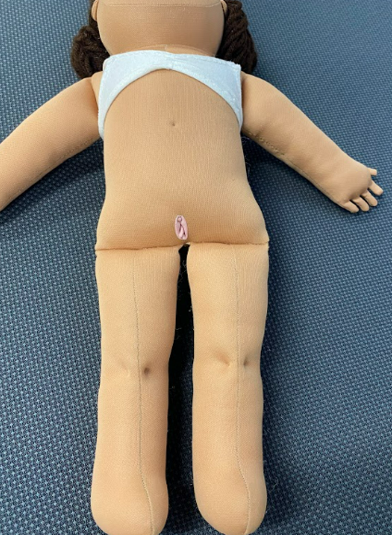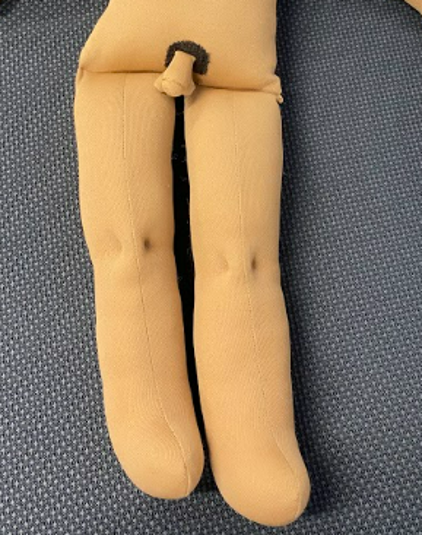- About
- Topics
- Picks
- Audio
- Story
- In-Depth
- Opinion
- News
- Donate
- Signup for our newsletterOur Editors' Best Picks.Send
Read, Debate: Engage.
| June 09, 2023 | |
|---|---|
| topic: | Child rights |
| tags: | #Thailand, #child rights, #sexual abuse |
| located: | Thailand |
| by: | Tara Abhasakun |
Setha ‘Faye’ Tienpiragul, a public prosecutor for Thailand’s Office of the Attorney General, has been working on a case in the northern province of Chiang Mai involving an uncle who allegedly sexually abused five of his nieces and nephews.
One factor that helped the prosecution is that the children have been able to use anatomical dolls to describe what their uncle had done to them. The dolls have private parts, which children can point to and indicate where their abuser touched them without having to speak about their experience.
“We used these dolls and it worked. The children were showing us the manner [in which] and where he touched them,” Faye told FairPlanet.
Hug Project, a Thailand-based NGO that fights child abuse and trafficking, brought the case to authorities.
Thai children who are sexually abused face several challenges in reporting their experience. For one, sex and abuse are still considered taboo topics in Thai culture, which makes it difficult for kids to talk openly about their ordeal. There is also a lack of training on how to interview children in abuse investigations. This can further traumatise children, and make them feel uncomfortable reporting the abuse. All the while, insufficient financial and human resources further exacerbate the problem.
Given the circumstances, some Thai advocates are now pushing for the implementation of systemic changes that would make it easier for child victims to report abuse.
Faye shared data from the Office of the Attorney General of Thailand with FairPlanet. In 2022, 2,393 children across Thailand were interviewed by Multi-disciplinary Teams (MDTs) in rape cases. MDTs consist of a social worker or psychologist, an individual whom the child trusts - if one is available, a public prosecutor, an inquiry official and a legal counsel. Out of all the children interviewed in rape cases, 630 were boys, and 1,763 were girls.
Meanwhile, 2,250 children were interviewed for cases involving other forms of sexual assault, such as molestation. Of these children, 561 were boys, and 1,689 were girls.
Anti-trafficking advocate Wirawan ‘Boom’ Mosby, the founder of Hug Project, has been working to promote awareness and change on this issue since 2015, and aims to instil a more child-friendly approach in child interviews in abuse investigations. Boom, who was named a Trafficking in Persons Report Hero by the US Department of State in 2017, has been working to implement child forensic interview protocols used in the US and other countries in Thailand.
“Basically, it’s the techniques on how to interview children that are traumatised [...] children who are victims of crimes,” Boom said.
Child forensic interviews were first developed in the US in the 1980s, Faye said, and that the first amendment to Thailand’s criminal procedure code concerning such interviews was passed in 1999. The code stated that the child interview should be conducted in an appropriate and separate place. At that time, Faye said, the concept was very new.
The code was amended again in 2007 to reflect additional changes in how minors are to be interviewed in criminal cases. Faye said that one of the added elements was having a psychologist or social worker pose questions that could potentially traumatise children. She noted, however, that in practice this is impossible seeing as all members of an MDT are in the same room.
Faye explained that around the time of the 2007 amendment, awareness about child forensic interviews had started to grow in Thailand.
As a first step, the MDT must develop a rapport with the child. The second step, called ‘anatomy identification,’ involves using anatomical drawings to help children identify their sexual organs. Faye said this step is important since many children may refer to their sexual organs as their ‘wee wee,’ for instance, and the authorities must know exactly what body part children are referring to.
The next step in child forensic interviews is called ‘touch inquiry.’ In this step, TMDs ask children how exactly they were touched. The hope is that by this point the child will start talking more openly about the abuse scenario, Faye said.
“You have to imagine that it will be very difficult for children to tell someone, strangers, ‘My uncle touched me here, and he was on top of me, and the clothes were on or off,’ ” she said.
One of the main hurdles in the struggle to implement proper child forensic interview practices in Thailand is the deep-rooted cultural taboo around sexual assault.
“We are of Asian culture, and a lot of times talking about sexual abuse or physical abuse in such an explicit manner that is required by law enforcement authorities is not something that Thai children are not used to,” Faye said.
On top of the taboos surrounding sexual assault, Thailand’s hierarchical social order can also make reporting sexual abuse dauting for children. “Many times we see the adults, even the social workers or the law enforcement, making it feel as though they are superior to the child that they are trying to interview,” said Boom. “Like, ‘Hey sit still,’ or ‘You need to sit better.’ Sometimes during the interview they say ‘Why do you have to do that?’ ”
Boom noted that in a forensic interview, the team cannot use the question “why,” as this may be perceived as judgmental.
Faye said that she has even seen police go into interview rooms “with full-on uniforms, some of them with guns on the back of their uniform.” She said, “That’s gotta scare children.”
Another challenge to overcome is limited budgets. More money is needed for child-friendly rooms where interviews can be conducted. Faye noted that there must also be tech rooms next to the child-friendly room, with camera equipment, a microphone, a TV, recording equipment, a computer and a conference room for the MDT.
Faye added that every province is required to have a child interview room, which may be located in police stations or prosecutors’ provincial offices.
Boom and Faye are both working on securing sufficient funding to provide every child interview room in Thailand with a set of anatomical dolls. The dolls have more detailed private parts compared to average dolls. They also have oral, genital and anal orifices through which children can demonstrate penetration.
A four-doll set costs roughly 2,500 baht (around USD 74), which Faye said is fairly expensive considering you’d have to purchase one for all police stations and provincial prosecutor’s offices in the country.
Faye said that the International Narcotics and Law Enforcement Affairs (INL) of the US State Department at the US Embassy in Bangkok has so far sponsored 10 sets of dolls. Meanwhile, Hug Project has sponsored six sets, and Royal Thai Police has sponsored a few as well. The sets have been placed in child interview rooms in provinces including Phuket, Chiang Mai, Pattaya and Samut Sakhon. This still, however, does not get Hug Project closer to its goal of having a doll in every interview room in Thailand.
Apart from the funding, Boom and Faye have also struggled to identify manufacturers for the dolls. Boom said that in the past when she had ordered sets of dolls it would take three to four months to arrive. She added that a woman she knew used to make the dolls, but no longer does so.
Another obstacle to conducting proper child forensic interviews in Thailand is insufficient training capabilities. Boom said that she and Faye have reviewed previous training materials and found that most of it focuses on the law and, to a lesser extent, medical assistance. However, there is a lack of training on child forensic interviews, they said. Boom noted that a few of her friends are licenced to conduct child forensic interviews but do not know how to properly build rapport with the children.
To address this gap in training, Boom and Faye have been conducting training sessions in Chiang Mai.
The two women are carrying on the fight to implement more compassionate practices around crimes investigations involving children in Thailand. Faye said she would like to see all police stations, child advocacy centres and public prosecutors’ offices have proper child interview rooms containing the necessary equipment, anatomical drawings and anatomical dolls.
“The justice system should not re-traumatise a child,” Boom said. “The child has already been traumatised enough with the situation that happened to them. People in the justice system need to protect children, and educate themselves on how to properly interview children.”
Image by Hug Project.
By copying the embed code below, you agree to adhere to our republishing guidelines.



![“We used these dolls and it worked. The children were showing us the manner [in which] and where he touched them.\'](https://www.fairplanet.org/wp-content/uploads/2023/06/child-interview-and-counseling-room-534x309.1686220619.jpg)
